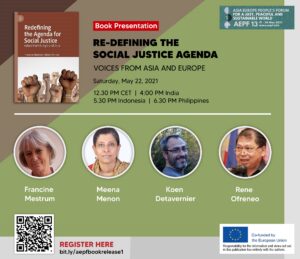The crisis of the coronavirus was a terrible reminder of how vulnerable people and societies have become in times of neoliberal policies and austerity. In the slipstream of this crisis we see a rapid digitalization of economies with serious consequences as well for all working people, in North and South.
If ever the need for protection was made clear, the current situation leaves no alternatives: people, all people, need protection, in a very broad sense. Neoliberal policies and austerity have to be stopped! We need more than nice slogans and kind recommendations; the time has come for structural changes.
That is why the Asia Europe People’s Forum and its Social Justice Cluster have been promoting a new and innovative concept of social protection, based on old principles and new ways for implementation.
Our aim is to fight the growing inequality, with wealth taxes, the abolition of illegitimate debt and the drastic reduction of military budgets. More particularly, we strive for free quality health care for all, free quality education for all students up to the tertiary level, affordable housing for every family with access to power and running water, work guarantee programs, living wages, guaranteed income for the sick and disabled, living pensions for senior citizens, subsidized public transport and free access to internet. Care should be a centre piece of all policies for environmental, economic and social justice.
Continue reading
